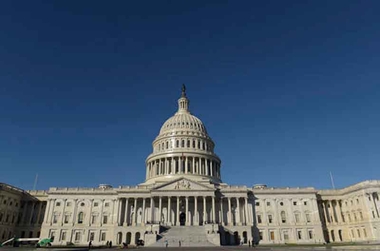LGBTQ rights looms as hurdle to passing defense policy bill

Washington (AP) — Congressional Republicans and Democrats will have to bridge a vast cultural divide over an issue that has nothing to do with bullets and bombs to complete a must-pass defense policy bill.
A key sticking point in the negotiations during the upcoming lame-duck session is a House-passed provision that Senate Democrats say would undercut protections against workplace discrimination based on sexual or gender orientation. They've called the measure dangerous and are demanding it be removed from the $602 billion measure.
Many House Republicans, however, view the provision as a bulwark for religious liberty and just as adamantly want it kept in the final package. Donald Trump's victory in the presidential election has strengthened their hand should the contentious debate begin anew next year.
"It's going to be a tough one for them to figure out," said Justin Johnson, a senior defense policy analyst at the Heritage Foundation, a conservative think tank. Drop the amendment and risk a backlash from rank-and-file Republicans, he said. Keep it in and Democrats could mobilize to block the defense bill, which authorizes spending for military programs that range from jet fighters to a pay raise for the troops.
A filibuster carries risks for Democrats. They could be hammered by the GOP for stymieing legislation important to U.S. service members and their families. And even if the provision is dropped to avoid a veto by President Barack Obama, Republicans — who control both houses of Congress — could wait until Trump is in the White House and attach the provision to a different bill.
"I think the election gives congressional Republicans a lot more leverage on this issue," Johnson said. "They don't have to be too worried about a veto threat because the situation only improves next year."
Although much of Trump's agenda on social issues remains opaque, he assured conservatives during the campaign that he would place a high priority on religious liberty.
The tenure of Indiana Gov. Mike Pence, the vice president-elect, was punctuated by his steadfast support for conservative social issues that at times drew unwanted attention to the state, most notably when a religious objections law he signed provoked a national backlash from critics who said it could sanction discrimination against LGBTQ people.
David Stacy, government affairs director at the Human Rights Campaign, acknowledged that the long-term prospects for barring the amendment from passing are challenging. But he said he's bullish about the short term. Congress has little incentive to drag out a lame-duck session and that means passing a defense bill unburdened by a provision that has no bearing on the Pentagon's core missions, according to Stacy.
"The blame could fall either way," said Stacy, suggesting Republicans could be seen as obstructionists for insisting the amendment be preserved at the expense of speedy passage of the defense bill.
The provision is brief and requires any U.S. government office to provide protections and exemptions "to any religious corporation, religious association, religious educational institution, or religious society that is a recipient of or offeror" for a federal contract.
Forty Senate Democrats plus two independents wrote in a letter last month that the provision would amount to government-sponsored discrimination by permitting religiously affiliated federal contractors to refuse to interview a job candidate whose faith differs from theirs and to fire employees who marry their same-sex partners or use birth control.
The provision would "vastly expand religious exemptions" under the Civil Rights Act and Americans with Disabilities Act to allow contractors "to harm hardworking Americans who deserve to be protected from workplace discrimination based on sexual orientation, gender identity, religious identity, or reproductive and other health care decisions," they said in the letter.
Republicans argued the measure merely builds on existing law by ensuring that faith-based organizations that perform work for the U.S. government aren't forced to act against their beliefs. The measure is known as the Russell amendment, named after its sponsor, Rep. Steve Russell, R-Okla.
Paradoxically, opponents of the Russell amendment may find support from Sen. John McCain of Arizona, the Republican chairman of the Senate Armed Services Committee who plays a central role in determining the contents of the defense policy bill.
The Arizona legislature passed a religious freedom bill in 2014 designed to give more legal protections to people who might be accused of discrimination for actions they took in accordance with religious beliefs. A frequently cited example is a business that denies service to gay or lesbian customers.
With the state facing a national backlash from business leaders, including the National Football League, McCain urged then-Gov. Jan Brewer to veto the legislation. She did.
"We're hoping he sees this the same way," said Maggie Garrett, legislative director for Americans United for Separation of Church and State.
By Richard Lardner, Associated Press. Copyright 2016 The Associated Press. All rights reserved. This material may not be published, broadcast, rewritten or redistributed.
The Gayly – November 11, 2016 @ 4:25 p.m.





